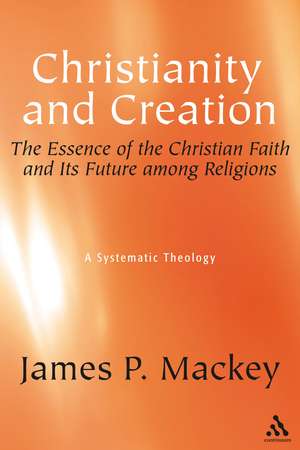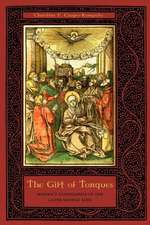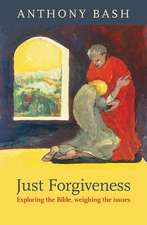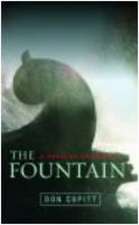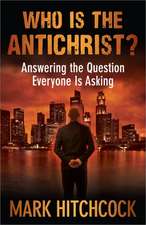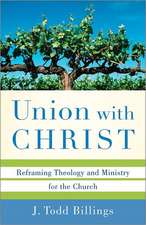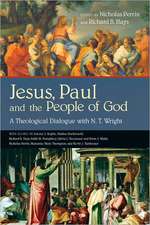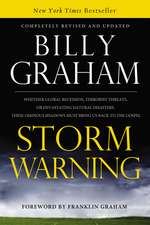Christianity and Creation: The Essence of the Christian Faith and Its Future among Religions
Autor Dr James P. Mackeyen Limba Engleză Paperback – 31 dec 2006
Preț: 299.59 lei
Preț vechi: 463.44 lei
-35% Nou
Puncte Express: 449
Preț estimativ în valută:
57.33€ • 62.47$ • 48.31£
57.33€ • 62.47$ • 48.31£
Carte tipărită la comandă
Livrare economică 23 aprilie-07 mai
Preluare comenzi: 021 569.72.76
Specificații
ISBN-13: 9780826419071
ISBN-10: 0826419070
Pagini: 424
Dimensiuni: 154 x 227 x 23 mm
Greutate: 0.58 kg
Editura: Bloomsbury Publishing
Colecția Continuum
Locul publicării:New York, United States
ISBN-10: 0826419070
Pagini: 424
Dimensiuni: 154 x 227 x 23 mm
Greutate: 0.58 kg
Editura: Bloomsbury Publishing
Colecția Continuum
Locul publicării:New York, United States
Caracteristici
Bold, radical reinterpretation of Christianity in light of a creation theology
Cuprins
Part One: The Essence of Christianity 1. Creation 2. Fall 3. Salvation 4. God Part Two: Christianity the Religion 5. Creed 6. Code 7. Cult 8. Constitution
Recenzii
"This remarkable and idiosyncratic book is the twelfth in a series of studies of theology and ethics by a distinguished Roman Catholic theologian currently teaching at Trinity College, Dublin. Mackey states that this book was written for "those who still maintain a thoughtful and preferably critical interest in religion" (p.xi). Mackey describes his book as a "standing on-scriptures theology. A thoroughly scriptural theology" (p.xii). This is its main strength, especially in part one which is filled with original, often profound, biblical exegesis, albeit with little discussion of historical critical issues. Mackey focuses on Genesis and John, which he describes as" the two most foundational, powerful and insightful books of the Bible" (p.145). On the basis, Mackey's book is an extended argument that Christianity is essentially a doctrine of creation, "a creation faith." The epilogue is a new approach to the relation of Christianity to other religions. Mackey begins with a critique of the traditional dichotomies of nature and grace and of revelation and reason and gets to the question of other religions only in the last twelve pages. His approach is quite radical. First, it is possible to be a follower of Jesus and his creation faith and not be a member of any church or any religion at all. Furthermore "there is probably no one true religion, but all exhibit in different measures percentages of truth and diminished truth and downright falsehood, of grace and disgrace" (p.397). Mackey states, "all [faiths] are at bottom creation faiths" (p.401). There is, however, little discussion of Eastern religions in this connection. In his chapter on creation in part one, Mackey has assessed positively the critique of the traditional idea of God by Heidegger, Neitzsche, Feuerbach, Marx and Sartre, and he concludes his final chapter with the following statement: 'Indeed if one put together these defining ingredients of the philosophies of Sartre, Nietzsche, and Marx... one would have in one's hands a tolerable recipe from which to cook a very edible theology of the essence of Christian faith for today' (p.402). In sum, although many of the important contributions of this book must go unmentioned, it is clearly a novel, radical, and creative reinterpretation of Christian faith and life that deserves wide and careful attention."- Owen C. Thomas, Anglican Theological Review, May 2007
"[A] serious and important book" Doctrine & Life
mention in Bulletin De Theologie, Revue de Science philosophiques et Theologiques, 2008
"This is a detailed and scholarly recapitulation of fundamental theology relating to salvation history as expressed in religious cult. The text is accessible to general readers but may be better suited to seminarians, theologians, and pastors. Mackey, a respected and frequently published theologian (e.g., Power and Christian Ethics), skillfully provides a contemporary perspective on Creation, the Fall, and Salvation without overwhelming the reader with proof texts and complicated arguments. Mackey is adept at capturing and elucidating the essential beliefs of Christianity and quickly sifts out accumulated theological hypotheses. The book is conveniently divided into two parts; namely, a consideration of the original faith of Jesus the Jew and the religion that later developed from this belief. Issues pertinent to creed, morality, cultic expression, and ecclesial constitutions are thoroughly treated. The epilog examines the role of Christianity in dialog with other world religions. A helpful index and limited bibliography are included. For theological libraries."
"A capstone achievement! Harvesting a lifetime of theological work, Mackey has crafted a sage and passionate reflection on the core beliefs of Christian faith that reconnects human beings with nature and both with God in a beautiful, holistic vision. This is a creation theology that does not neglect sin, a christology that places Jesus Christ at the hub, all the while honoring indigenous and world religions, an eschatology shot through with scientific learning yet replete with hope for eternal life. A powerful legacy to spur reflective persons of the twenty-first century into new appreciation of their tradition and acion in its light."-Elizabeth A. Johnson, Disinguished Professor of Theology, Fordham University
"For too long it has been felt that theology and religion itself have been a dry, barren desert. James Mackey has returned to the source (the Bible) and revealed a rain forest. Many churches, and particularly the Roman part of the Catholic church, will hate and fear this book. But its scholarship and insights will water the souls and minds of many people. It will also guide a healthy and life-giving religious debate."-Dr. Denis Bradley, vice-chair, Northern Ireland Policing Board
"In this brilliant, new book, written with inspirational vision and no academic paraphernalia, but relying simply on the Bible and the Christian creeds, James Mackey presents God's grace and truth in the natural history of the only world we know to exist, reinterpreting creation, fall, salvation, revelation, faith and grace in a sweeping theology of creation."-John Bowden, editor of Christianity: The Complete Guide
"[A] serious and important book" Doctrine & Life
mention in Bulletin De Theologie, Revue de Science philosophiques et Theologiques, 2008
"This is a detailed and scholarly recapitulation of fundamental theology relating to salvation history as expressed in religious cult. The text is accessible to general readers but may be better suited to seminarians, theologians, and pastors. Mackey, a respected and frequently published theologian (e.g., Power and Christian Ethics), skillfully provides a contemporary perspective on Creation, the Fall, and Salvation without overwhelming the reader with proof texts and complicated arguments. Mackey is adept at capturing and elucidating the essential beliefs of Christianity and quickly sifts out accumulated theological hypotheses. The book is conveniently divided into two parts; namely, a consideration of the original faith of Jesus the Jew and the religion that later developed from this belief. Issues pertinent to creed, morality, cultic expression, and ecclesial constitutions are thoroughly treated. The epilog examines the role of Christianity in dialog with other world religions. A helpful index and limited bibliography are included. For theological libraries."
"A capstone achievement! Harvesting a lifetime of theological work, Mackey has crafted a sage and passionate reflection on the core beliefs of Christian faith that reconnects human beings with nature and both with God in a beautiful, holistic vision. This is a creation theology that does not neglect sin, a christology that places Jesus Christ at the hub, all the while honoring indigenous and world religions, an eschatology shot through with scientific learning yet replete with hope for eternal life. A powerful legacy to spur reflective persons of the twenty-first century into new appreciation of their tradition and acion in its light."-Elizabeth A. Johnson, Disinguished Professor of Theology, Fordham University
"For too long it has been felt that theology and religion itself have been a dry, barren desert. James Mackey has returned to the source (the Bible) and revealed a rain forest. Many churches, and particularly the Roman part of the Catholic church, will hate and fear this book. But its scholarship and insights will water the souls and minds of many people. It will also guide a healthy and life-giving religious debate."-Dr. Denis Bradley, vice-chair, Northern Ireland Policing Board
"In this brilliant, new book, written with inspirational vision and no academic paraphernalia, but relying simply on the Bible and the Christian creeds, James Mackey presents God's grace and truth in the natural history of the only world we know to exist, reinterpreting creation, fall, salvation, revelation, faith and grace in a sweeping theology of creation."-John Bowden, editor of Christianity: The Complete Guide
